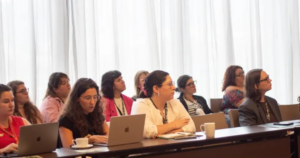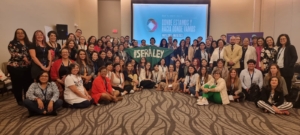A new judicial rejection of those who seek to take away our rights
“Below, we offer a google translate version of the original article in Spanish. This translation may not be accurate but serves as a general presentation of the article. For more accurate information, please switch to the Spanish version of the website. In addition, feel free to directly contact in English the person mentioned at the bottom of this article with regards to this topic”.
Today, the First Administrative Contentious Chamber of the Province of Córdoba has confirmed the constitutionality of abortion by rejecting the unfounded injunction filed against the application of Law 27610 in our province. This decision makes it clear that legal proceedings should not be used as a tool to obstruct the exercise of human rights for women and individuals with the capacity to become pregnant.
Despite the futile attacks and the displeasure of groups seeking to roll back the acquired rights over our bodies, abortion is protected by law and enjoys broad legal and social consensus.
Key points from the court ruling:
The Chamber has decided to reject the injunction with the votes of two judges, Ángel Antonio Gutiez and Gabriela Cáceres. Judge Leonardo Massimino issued a dissenting opinion.
Judge Gutiez states that the action should be rejected outright because it is merely an expression of dissatisfaction with Law 27610, rather than a challenge to local legislation or public policy that would justify the injunction. However, due to the significance of the underlying issue and its various impacts on society, he addresses the plaintiff’s arguments.
Firstly, he affirms that Law 27610 is the result of balancing fundamental rights by the legislators of the National Congress in the legitimate exercise of their powers and as representatives of the whole society. These rights encompass those of the hypothetical human being in the womb and those of women and individuals with other gender identities who have the capacity to become pregnant.
Regarding the protection of the right to life, the ruling states that, contrary to the plaintiff’s claim of absolute protection of life from conception, “in our legal system, human life, since its beginning at conception, receives varying degrees of protection that increase as the fetus grows. If born alive, that ‘child’ obtains the full range of rights that protect an individual who can live independently outside the body that hosted them throughout their life until its end.” This gradual and incremental protection of the right to life arises from the American Convention on Human Rights and the interpretation made by the Inter-American Commission on Article 4 in the “Baby Boy” case. Therefore, legislation that allows exceptional cases that restrict the broad concept of the right to life, such as Law 27610, is respectful of this treaty.
Regarding the purpose of Law 27610, the judge asks why there was a need for a law on access to voluntary termination of pregnancy. The ruling states that the reasons why a woman wishes to have an abortion can be manifold, but they are all intimately personal, and it is her sole responsibility to assess them. The ruling emphasizes that it is the woman who will have to carry the result of conception in her body for nine months, with all the risks involved, and who will have to give birth, with all the pain and risks that entails, even with the advances in modern medicine. The ruling states that in a reality where abortions occur, whether legal or illegal, Law 27610 should only be seen as a measure of healthcare; nothing more than that. The law’s sole purpose is to ensure that women who decide to have an abortion, guided solely by their conscience, can do so under appropriate healthcare conditions, allowing them to terminate the pregnancy without the risk of death or permanent sterility, among other equally undesirable outcomes.
The ruling unequivocally affirms that “the law does not encourage the killing of children; the law does not promote abortions. The only thing the law does is to permit women who decide to have an abortion to do so in an environment where their health is protected. […] What a woman seeks through abortion is to free herself from the pregnancy itself and from the care of a child that may be born. Which of these reasons or others leads her to make that momentous decision belongs to her innermost sphere, and the State cannot, in order to protect a potential person, so severely restrict a woman’s will.”
Regarding the provincial and national competencies in health matters, the plaintiff argued that the national government exceeded its powers by enacting the law, and therefore, the province should not have applied it within its territory. However, the Chamber understands that the powers over health policy are concurrent between the Nation and the province of Córdoba, and it states that “issues related to health law and public health can be regulated by federal or national laws. Asserting the opposite would be tantamount to postulating the unconstitutionality of laws on organ transplants (24,193), sexual health (25,673), patient rights (26,529), mental health (26,657), vaccination (27,491), comprehensive health care during pregnancy and early childhood (27,611), among others.”
Regarding the lack of a specific case to trigger the constitutional review, the injunction requested the declaration of unconstitutionality of the law in the province. However, the Chamber understands that there is no concrete case on which to apply constitutional review. In this regard, it states that “the Argentine system of judicial control over norms with respect to the Constitution is diffuse, meaning that any court can exercise it in the case presented for its resolution. What cannot be done, not even by the Supreme Court of Justice of the Nation, even if it issues a hundred identical judgments, is to universally repeal the application of a law enacted by the National Congress.”
Regarding the relevance of the Supreme Court precedent in the FAL case, the plaintiff requested the declaration of unconstitutionality of several articles of Law 27610, particularly focusing on Article 16. This article amends Article 86 of the Penal Code, which previously regulated abortions in exceptional cases. The Chamber notes that the Supreme Court already ruled on this issue in the FAL case in 2012, a discussion that the plaintiff seeks to reopen, and states that “all the tortuous imagination displayed by the plaintiff in imagining extreme and barbaric scenarios to try to validate his position has a response in the very Supreme Court of Justice of the Nation” which ruled on this matter in the FAL case.
Regarding the rights of women and individuals with the capacity to become pregnant, Judge Gutiez points out that the plaintiff completely disregards the rights granted to women and pregnant individuals by International Treaties, as well as the National and Provincial Constitutions. He notes that the plaintiff diminishes women as holders of their own rights, “treating them more as mere receptacles for unborn individuals.”
Finally, in concluding the ruling, the judge states that: “The era we live in our country has meant and means progress in recognizing the rights of women as such, demolishing barriers, preconceptions, stigmas, and prejudices; recognizing their unique and singular entity and identity. Among these essential rights is the simple right to choose; the right to choose whom to relate to and how; the right to choose to have or not to have children; the right to choose how far she wants to advance in her career, work, or profession, breaking any glass ceiling; the right to independently decide what to do with her body. Law No. 27,610 allows women to exercise one of these choices without interference from any other person, religious organization, or the State.”
With this ruling, the judiciary reaffirms that abortion is a right that all women and individuals with the capacity to become pregnant in the province of Córdoba can enjoy within frameworks of respect and dignity.
Therefore, today and always, we will continue raising our flags: throughout the country, abortion is legal.
Access the full ruling for more information.
Contact
Mayca Balaguer, maycabalaguer@fundeps.org



